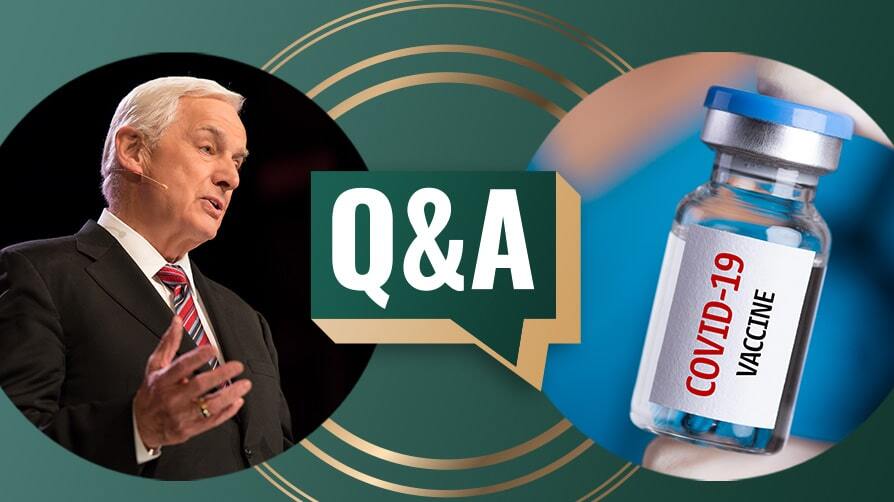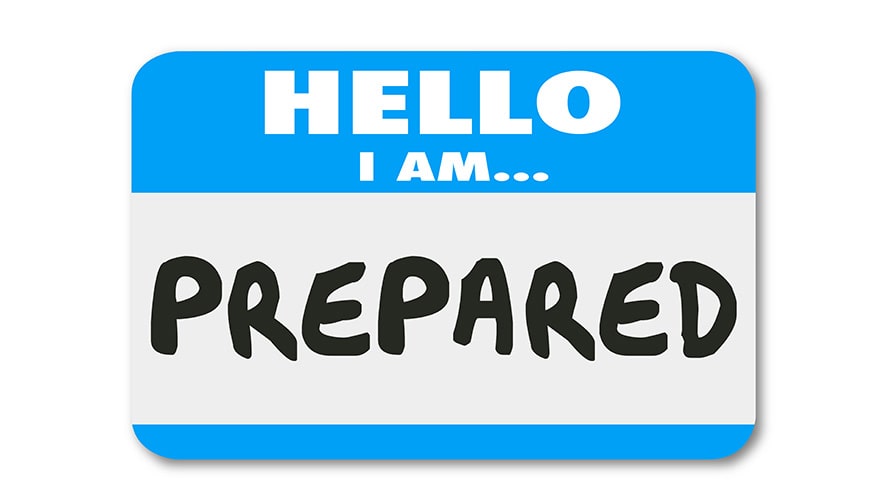Facing the Coronavirus: 6 Strategies for Christians
It’s no secret that COVID–19 has created an unprecedented crisis in our nation and the world. For the first time in my lifetime, major events and activities have been canceled to stem the tide of a lethal virus. Schools at all levels are either closed for a time or have transitioned to online learning. Broadway theaters have gone dark. Professional sporting events have been suspended. Stock prices are erratic. Social distancing is the new buzz word, and President Trump has declared a national emergency.
What are we to do with all this information?
Everyone seems to have a different idea of how we should respond to the coronavirus. Some people are placing their faith in stockpiles of toilet paper and bleach. Others are dismissing the government’s warnings as an overreaction. Many are overwhelmed and confused.
As a pastor—and not an infectious disease expert—I have a different perspective. I find hope in the words Jesus spoke to His disciples in the Upper Room, just before His crucifixion: “Peace I leave with you, My peace I give to you; not as the world gives do I give to you. Let not your heart be troubled, neither let it be afraid” (John 14:27).
These words offer us the opportunity to respond with faith and wisdom instead of fear and panic. As followers of Christ, there are six strategies we can implement as we face the coronavirus pandemic.
1. Concentrate on Prayer
In the middle of all the uncertainty surrounding us at this time, it’s difficult to think of a better prayer than the one spoken by a desperate–but–confident Judean king named Jehoshaphat.
Jehoshaphat’s ancient perspective applies to our current situation more than we might think. In his context, a dangerous delegation from Edom was closing in on Judah, but his faith was all–encompassing. He trusted the Lord in the face of a potential military defeat and for any disaster that might come:
If disaster comes upon us—sword, judgment, pestilence, or famine—we will stand before this temple and in Your presence (for Your name is in this temple), and cry out to You in our affliction, and You will hear and save. (2 Chronicles 20:9, emphasis added)
Throughout the king’s prayer, He appeals to God’s character, His promises, and His actions in the past. The prayer culminates in this statement: “We have no power against this great multitude that is coming against us; nor do we know what to do, but our eyes are upon You” (2 Chronicles 20:12).
Will we pray, or will we worry?
Jehoshaphat could have allowed himself to be consumed with worry, but he prayed instead. We face the same choice: will we pray, or will we worry?
While we remain on alert against viruses of doctrine or disease, worrying won’t change our circumstances or lower our risk of infection. It won’t help us fight off illness or move us to action. Worrying about COVID–19 (or anything else) will only increase our troubles. Rather than worrying and being anxious, Jesus calls us to respond with prayer and faith in Him (Matthew 6:33–34; Philippians 4:6–7).
One author has said, “It takes the same amount of energy to worry as to pray. One leads to peace, the other to panic.”1 This cannot be emphasized enough right now. We need to call out to Almighty God and ask Him to protect us from this disease. We need to ask God to touch those who are infected. We need to pray for everyone on the frontlines of this pandemic—from medical professionals to government officials to aid workers. We need to stand before the Lord in faith.
2. Control Your Mind
The human imagination is a powerful force that can create a vision of a desirable future or conjure up every worst–case scenario. Dark products of the imagination can put us in the grip of fear—a place God would never have us go.
The apostle Paul tells us, “God has not given us a spirit of fear, but of power and of love and of a sound mind” (2 Timothy 1:7). As this Scripture shows, the power that banishes fear is a sound mind. We maintain a sound mind by “bringing every thought into captivity to the obedience of Christ” (2 Corinthians 10:5).
When a thought that is not from God enters our mind, we need to examine it in light of the knowledge of God. We need to ask ourselves, does this thought have any basis in reality? If not, take it captive.
Gaining a sound mind is not as difficult as it sounds. Begin by being in the Word of God every day—and then invite the Holy Spirit to guide your thoughts. A mind centered on the truth of God is the key to controlling your mind.
The best definition I’ve heard for anxiety is “imagining the future without Jesus in it.” When we realize that Jesus is present today and will be present tomorrow, we can be free from worry.
3. Count Your Blessings
In times like these, our blessings become clearer, richer, and more meaningful. Something happens deep in our heart when we count those blessings. Ephesians 1:3 says, “Blessed be the God and Father of our Lord Jesus Christ, who has blessed us with every spiritual blessing in the heavenly places in Christ.” Which spiritual blessings has He provided? Every single one—period!
When we slow down, our concentration sharpens, and our perception of what’s truly important comes into focus, allowing us to appreciate and enjoy the simple blessings of life.
The Bible doesn’t say we have to be thankful for all things. But it does say we should be thankful in all things:
In everything give thanks; for this is the will of God in Christ Jesus for you. (1 Thessalonians 5:18)
Be anxious for nothing, but in everything by prayer and supplication, with thanksgiving, let your requests be made known to God. (Philippians 4:6)
From the Lord’s abundance, we have received countless blessings. Let’s take this opportunity to slow down, focus on Him, and be thankful for His blessings.
4. Claim Your Promises
A man once said to evangelist D. L. Moody, “I’ve found a wonderful verse to help me overcome my fear.” Then he quoted Psalm 56:3: “Whenever I am afraid, I will trust in You.”
“Behold, God is my salvation, I will trust and not be afraid.” Isaiah 12:2
Moody replied, “I can give you a better promise.” And he quoted Isaiah 12:2: “Behold, God is my salvation, I will trust and not be afraid.”
Before he passed away due to complications of ALS in 2016, Pastor Ed Dobson wrote a little book entitled Prayers and Promises, in which he described the weakness he felt during his illness. For years, he had bored into God’s Word like a drill, but eventually, it became difficult for him to read the Bible or even to pray. God responded by giving him a few verses each day that kept him calm and strong. Hebrews 13:5–6 helped him more than any other passage in the Bible: “He Himself has said, ‘I will never leave you nor forsake you.’ So we may boldly say: ‘The Lord is my helper; I will not fear. What can man do to me?’”
God has given us many promises in His Word—we just need to claim them!
Consider Your Responsibility
Writing for The Gospel Coalition, Todd Wagner states:
Throughout history, Christians have often stood out because they were willing to help the sick even during plagues, pandemics, and persecutions. They loved people and weren’t afraid of death because they understood that “to live is Christ and to die is gain” (Philippians 1:21). By stepping into the mess of sickness and disease, they were able to demonstrate their faith to a watching world. So, rather than just asking “How do I stay healthy?” perhaps we should be also ask [sic] “How can I help the sick?” Let’s be quick to help and slow to hide in basements.2
During this time of unprecedented uncertainty, others need to be encouraged and cared for. Call or text someone with an encouraging word or offer to run an errand for someone who is housebound. During this time of personal distancing, take the time to pray with someone on the phone. You can be the hands of Jesus reaching out to those in need today—consider it your responsibility.
6. Continue Your Work
There are a lot of things we are accustomed to doing that we simply cannot do right now. Many of us cannot visit with friends or dine in a restaurant or attend church services. But rather than focusing on what we cannot do, let’s focus on what we can do. Consider the words of this old poem:
From an old English parsonage down by the sea
There came in the twilight a message to me;
Its quaint Saxon legend, deeply engraven,
Hath, it seems to me, teaching from Heaven.
And on through the doors the quiet words ring
Like a low inspiration: “DO THE NEXT THING.”
Many a questioning, many a fear,
Many a doubt, hath its quieting here.
Moment by moment, let down from Heaven,
Time, opportunity, and guidance are given.
Fear not tomorrows, child of the King,
Trust them with Jesus, do the next thing.
Do it immediately, do it with prayer;
Do it reliantly, casting all care;
Do it with reverence, tracing His hand
Who placed it before thee with earnest command.
Stayed on Omnipotence, safe ‘neath His wing,
Leave all results, do the next thing.
Looking for Jesus, ever serener,
Working or suffering, be thy demeanor;
In His dear presence, the rest of His calm,
The light of His countenance be thy psalm,
Strong in His faithfulness, praise and sing.
Then, as He beckons thee, do the next thing.
Do the next thing!
The fact that we are on this earth is a clear indication that God has meaningful work for us to do. If we pray and ask God for guidance, He will show us the next thing to do.
Even as we battle the current pandemic, Jesus comes to us in our struggle, offering the peace and encouragement we need. In John 14:27, He said, “Peace I leave with you, My peace I give to you; not as the world gives do I give to you. Let not your heart be troubled, neither let it be afraid.”
We have access to divine peace and supernatural strength through Jesus Christ our Lord. The only question is whether we will tap into that power. My prayer is that you will join me in choosing to respond to this crisis with peace instead of panic and faith instead of fear. Do the next thing!
Sources:
1Todd Wagner, “Should Christians Be Anxious About the Coronavirus?” The Gospel Coalition, March 3, 2020, https://www.thegospelcoalition.org/article/christians–anxious–coronavirus/, accessed on March 20, 2020.
2Ibid.
I need help

Your response has been received, and we will be praying for you.
Look for answers to some of the most common questions in the weeks ahead.










